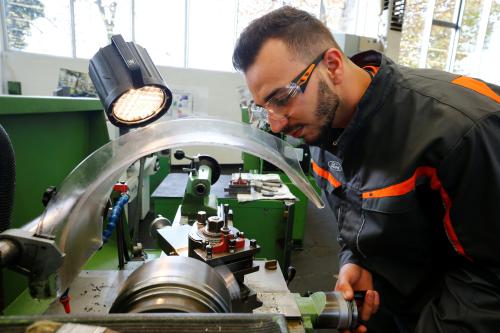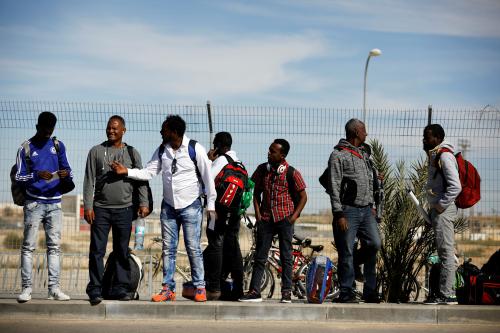This World Refugees Day, I want to challenge what seems to be the conventional wisdom regarding refugees. Not only are refugees not a burden, rather they are welfare-enhancing assets. Indeed, accepting, protecting, and empowering refugees is a win-win-win formula: for the refugees themselves, for the country of destination, and for the country of origin.
It is a win for the refugees for obvious reasons: The earlier a state commits to protecting refugees, the earlier they can move forward with their lives, without uncertainty blocking the way. Most importantly, accepting them protects the most precious right of all: The right to live. Turning our backs to refugees in many cases could be fatal for them. Thus, accepting refugees—providing the most basic protection—is, in many cases, lifesaving.
Accepting refugees is also a win for the receiving country and the communities that host them. By providing them with the right to work, to health, and to education, refugees can start productive lives in their host countries. The faster they can integrate into the labor force, the faster they can become productive members of society.
Are you worried about all the job opportunities natives could lose to a refugee? Don’t be. Most migration economists agree that the presence of more foreigners in the labor force doesn’t hurt natives, mainly because natives and foreigners typically have a different set of skills and compete for different types of jobs—a fact recently corroborated using data on refugees resettled in the U.S. Moreover, native workers often do better in the presence of more migrants in the labor force because in response to more competition, natives usually specialize in better-paid jobs that migrants cannot always compete in (for instance, jobs that require perfect domain of the local language).
Finally, we know that migrants engage in entrepreneurship at much higher rates than natives. In the U.S., for example, while migrants are 15 percent of the population, they represent 25 percent of entrepreneurs. If you think about it, this should not really come as a surprise. The act of migrating (and even fleeing to further away countries, in the case of refugees) is associated with risk-taking behavior. Thus, migrants are more likely to take risks also in the business sphere, such as creating a new venture. By creating new businesses, migrants also create new jobs for everyone. Small firms, in turn, are the engines of job growth. In the U.S., they create about 1.5 million jobs every year.
Receiving countries can benefit in more ways, too. Refugees could play a fundamental role in fostering international trade and investment. Since they know the business environment quite well, they can mediate between business people in both countries who are willing to invest in the local community and trade with local businesses. Therefore, these refugees can move the needle when it comes to integrating their communities in global markets in robust ways.
What about origin countries? They can also benefit immensely in the medium- to long-term from the resettlement of their citizens as refugees in foreign countries. First, the countries of origin also benefit from the creation of business networks between them and the countries where the refugees were resettled. For developing countries overcoming conflict, the flow of investment could be crucial for recovery. In addition to these business networks, the refugees can play a significant role in transferring technologies and knowledge back home, which translates into more competitive and diversified economies. In ongoing research with several co-authors, we show how, for instance, the nations that emerged from the former Yugoslavia hugely benefited from the knowledge and experience gained by Bosnian, Croat, and Serb refugees who temporarily resettled in Germany during the war of the early 1990s.
More generally, even if a refugee is not a regular migrant (refugees are forced to flee, as opposed to many migrants who choose to do so), the studies have shown that the economic benefits of migration also apply when focusing on refugees. This is because, similarly to migrants—and regardless of the reason that originated their move—they still bring a different set of skills than natives, which can be key to creating business networks and knowledge diffusion.
Naturally, as in any other change that affects the economy (regulation, reforms, external shocks, etc.) integrating refugees into the labor force might result in some people being worse-off in the short term, even when the aggregate gains are positive. But that speaks to the need for having proper safety nets in place, and not to rejecting refugees. Overall, if given the right protections and support, refugees can be an asset—not a burden—for all countries involved. Therefore, accepting and protecting refugees is not only morally right, but also the smart thing to do.
The Brookings Institution is committed to quality, independence, and impact.
We are supported by a diverse array of funders. In line with our values and policies, each Brookings publication represents the sole views of its author(s).






Commentary
Why accepting refugees is a win-win-win formula
June 19, 2018